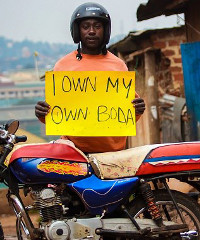Company providing loans in the form of a new motorcycle
Uganda-based Tugende offers an affordable lease-to-own model to help motorcycle taxi drivers own their own motorcycles in 18 months or less instead of renting indefinitely. How we made it in Africa interviewed the company’s co-founder and CEO Michael Wilkerson.
Give us your elevator pitch.
There are at least 100,000 motorcycle taxi drivers in Uganda’s capital Kampala and many more in the rest of the country and region. Most drivers do not own their own motorcycle, but rent from a landlord with no fixed contract. Tugende identifies responsible drivers, provides additional training, and offers a fair lease-to-own model through which drivers earn ownership in 18 months or less. Ownership doubles take-home income and allows drivers to invest more in their families and futures.
How did you finance your company?
Our original capital came from personal savings of my co-founders and myself. In my case I made an unexpected profit selling Marvel Entertainment stock that I bought when I was 13 (the company was later acquired by Disney). It was a no brainer for us that our customers would repay, but others thought it was a huge risk because motorcycle taxi drivers don’t have the best reputation. In 2013, after participating in the Unreasonable Institute, we raised a seed round, mainly from angel investors who liked the simplicity and high social impact of our business. We just closed another round at the end of 2014. A lot of it was previous investors putting in additional funds, but we also were fortunate to have existing investors help pitch us to their peers. Winning an Echoing Green global fellowship also helped a lot, especially in verifying our poverty reduction impact. This definitely both generated some interest and helped us prove the model works to help people beyond just making money.
For our next round, we’re hoping to work with larger institutional investors, both to add their know-how to help us start scaling rapidly, and to set up more complex credit and debt facilities so we can access the working capital we need.
If you were given US$1m to invest in your company now, where would it go?
We would immediately invest $100,000 in hiring additional super-star staff and turbo-charging ongoing projects to improve our internal operations, particularly customer and data management software. The easier we make it for our staff to work with customers, the faster and better we can serve them. The other $900,000 would help us buy about 700 more motorcycles to meet our growing demand and open 1-2 new branches in Uganda. The great thing is that because the customer demand is there, the new staff and systems would be paying for themselves within one year just based on that additional growth in active leases.
What risks does your business face?
Theft and road safety are our biggest risks. Unfortunately motorcycles are one of the most fungible commodities besides cash, and drivers are often robbed. Additionally, like many developing countries, rule of law on the road is lacking, and motorcyclists are often treated like second class citizens and run off the road or otherwise endangered by other vehicles. Many motorcyclists as well are either poor drivers or intentionally ignore road rules, but Tugende customers receive extra training and risk losing their lease if they are arrested or reported to drive poorly. Our accident rates are very low, something we attribute to selecting good customers and the long-term thinking that a path to ownership creates.
What has been the biggest mistake you have made in your company, and what have you learnt from it?
Early on, we over-invested in trust and under-invested in systems. Uganda and many of the neighbouring countries we aim to grow to are very informal and corruption can be a problem. Sometimes there is intense peer pressure on people in a position of power or with access to cash to do the wrong thing, knowing it is wrong, to “help” people who are putting pressure on them, maybe because they share a relative or come from the same area. We have recruited and will continue to recruit great people, but have also learned to make sure we have clear expectations, policies, and systems that make the right decisions easy for all staff and customers.

